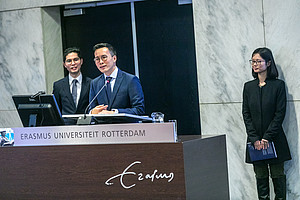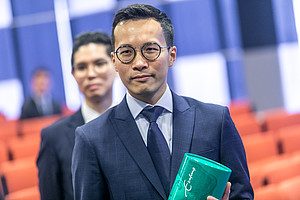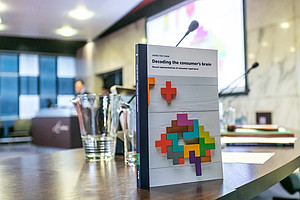PhD Defence Hang-Yee Chan

Hang-Yee Chan was awarded a doctorate with the distinction cum laude for his dissertation: 'Decoding the consumer’s brain: Neural representations of consumer experience’, Hang-Yee Chan studies consumer experience – what consumers think about brands, how they feel about services, whether they like certain products – is crucial to marketing practitioners. Hang-Yee Chan defended his dissertation in the Senate Hall at Erasmus University Rotterdam on Friday, 13 March 2020 at 13:30. His supervisors are Prof. Ale Smidts (RSM) and Dr. Maarten Boksem (RSM). Other members of the Doctoral Committee are Gerrit van Bruggen (RSM), Emily Falk (University of Pennsylvania), Hilke Plassmann (INSEAD), Aurélie Lemmens (RSM) and Alan Sanfey (Radboud University).
About Hang-Yee Chan

Hang-Yee Chan was born in Hong Kong, China. He received his Bachelor’s degree in Cognitive Science from the University of Hong Kong (first class honors). Afterwards, he obtained his first Master’s degree in Human and Environmental Studies at Kyoto University, Kyoto, Japan; and his second Master’s degree in Cognitive Science at École Normale Supérieure, Paris, France. In 2014, he started his PhD research in Marketing at the Erasmus Research Institute in Management, specializing in consumer neuroscience. He was a visiting research scholar at Stanford University (August to December 2017) and University of Pennsylvania (September 2018).
His research interest lies in the use of neuroimaging data to uncover consumer’s thoughts and feelings. His work has been published in both top marketing and neuroscience journals, such as Journal of Marketing Research and NeuroImage. His work on neural profiling of brand image has won him the ERIM Top Article Award 2019. He also presented at major international conferences, including the Annual Conference of the Society for Neuroeconomics and the European Association of Consumer Research Conference.
In September 2019, he started working as a postdoctoral researcher at the University of Amsterdam.
Thesis Abstract

Understanding consumer experience – what consumers think about brands, how they feel about services, whether they like certain products – is crucial to marketing practitioners. ‘Neuromarketing’, as the application of neuroscience in marketing research is called, has generated excitement with the promise of understanding consumers’ minds by probing their brains directly. Recent advances in neuroimaging analysis leverage machine learning and pattern classification techniques to uncover patterns from neuroimaging data that can be associated with thoughts and feelings. In this dissertation, I measure brain responses of consumers by functional magnetic resonance imaging (fMRI) in order to ‘decode’ their mind. In three different studies, I have demonstrated how different aspects of consumer experience can be studied with fMRI recordings. First, I study how consumers think about brand image by comparing their brain responses during passive viewing of visual templates (photos depicting various social scenarios) to those during active visualizing of a brand’s image. Second, I use brain responses during viewing of affective pictures to decode emotional responses during watching of movie-trailers. Lastly, I examine whether marketing videos that evoke similar brain responses among consumers turn out performing better in the market. These three studies show how analysis of brain responses uncovers nonverbal and ephemeral experiences of consumers. While mindful of the technical and ethical challenges, this dissertation hopefully lays the groundwork for the expansion of consumer neuroscience from resolving ‘how consumers use their mind’ to focusing on ‘what consumers have in mind’.
View photos of Hang Yee Chan's defence
Photos: Chris Gorzeman / Capital Images


